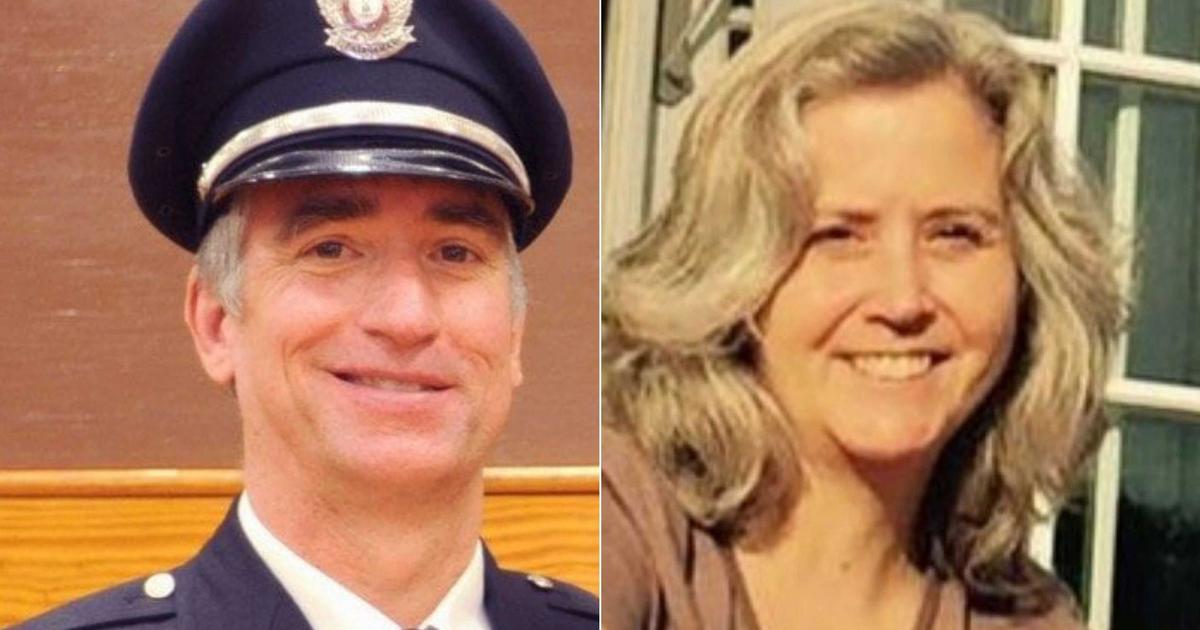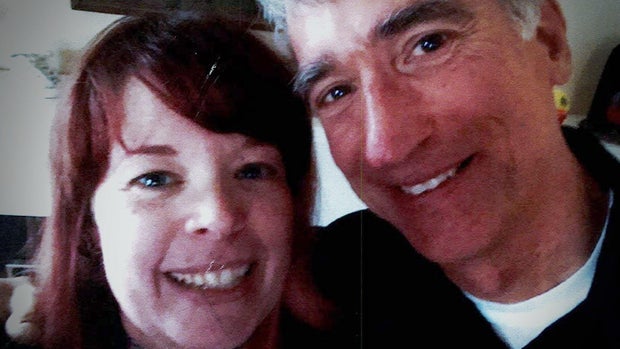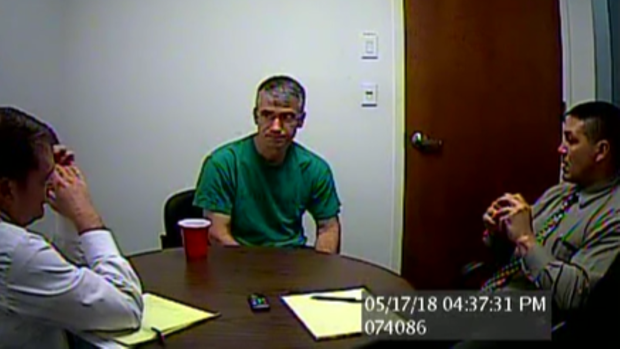CBS News
Massachusetts detective searched gunshot residue testing online 11 days before his wife is shot dead

When Massachusetts State Police detectives responded to a reported suicide in Westfield, Massachusetts, on May 8, 2018, they found Amy Fanion dead on her dining room floor with a gunshot wound to her head. Her husband, Brian Fanion, a Westfield Police detective, had called 911, reporting that Amy Fanion had shot herself.
At the scene, detectives made several discoveries that raised questions. The gun used in the shooting was Brian Fanion’s service weapon. And there was a lack of gunshot residue on Amy’s head, which was unusual in a self-inflicted gunshot wound. What had happened in that dining room that morning? “48 Hours” contributor Nikki Battiste takes a look at the evidence in “The Detective’s Wife,” an all-new “48 Hours” airing Saturday, May 4 at 10/9c on CBS and streaming on Paramount +.
Detective Brendan O’Toole took Brian Fanion to the State Police barracks in Russell, Massachusetts, to get his statement of the events surrounding his wife’s sudden death. At the end of the interview, O’Toole asked Fanion to turn over his phone for data extraction. Fanion complied but gave a caveat.
“I turned off the recorder and that’s when Brian told me … ‘you’re going to see some things on there and it’s not what it appears to be,'” O’Toole told “48 Hours.”
Hampden County Superior Court
Investigators would discover thousands of deleted text messages between Brian Fanion and a woman named Corrine Knowles, known as Cori. Brian Fanion had told O’Toole he and Knowles were just friends, but the text messages conveyed that the relationship had become something more.
On May 17, three days after Amy Fanion’s wake, O’Toole and Detective Mike Blanchette confronted Brian Fanion about his relationship with Knowles as well as the lack of gunshot residue found on Amy Fanion’s wound.
“I mean, there’s no doubt she was shot … but the question is, from what distance,” O’Toole asked Fanion.
Hampden County Superior Court
Within a week, investigators seized all of Fanion’s electronics, including his office computer and laptop at the Westfield Police Department. When Detective Tom Forest from the Cyber Crime Unit examined the computer’s hard drive, it revealed peculiar web searches and online activity he considered notable to the investigation. The online activity began about three months before Amy Fanion’s death, around the time Brian Fanion and Knowles’ friendship turned flirtatious.
“… it’s only when this affair starts up … that all of these incriminating searches start to appear,” Hampden County Assistant District Attorney Mary Sandstrom told “48 Hours.”
The first of these inquiries was related to common household poisons. On the morning of Feb. 12, Brian Fanion searched “household poisons,” “dangerous sources of radiation,” “worst sources of radiation” and “common prescription overdoses.” He also visited web pages titled, “9 Surprising Sources of Radiation in Your Home;” “Carbon Monoxide: The Invisible Killer;” “Common and dangerous poisons;” “16 Common Household Items That Could Kill You;” “What Over-the-Counter Medications Can You Overdose From?;” “Which Drug Causes the Most Deaths Each Year?” and, finally, “Prescription Drugs Linked to Most Fatal Overdoses.”
At trial, Brian Fanion’s defense attorney Jeffrey Brown argued that the Fanions were preparing to have a young niece stay with them and that some of the websites were related to potential hazards their 200-year-old house might pose.
At the beginning of March 2018, Fanion repeatedly Googled his potential lover, Cori Knowles. On April 2, as things heated up between Fanion and Knowles, he began questioning the nuances of affairs, searching “can you have an affair without sex.”
Two weeks later, on April 17, Fanion began researching divorce laws in Massachusetts. Several web pages he visited were related to pension rights after divorce. Fanion was planning for his upcoming retirement, and according to Knowles in an interview with police, he feared losing part of his pension if he were to divorce his wife. The following day, Brian Fanion’s inquiries into infidelity resumed, visiting web pages titled “My perfect affair – how I’m getting away with it” and “Emotional Infidelity: Worse Than A Sexual Affair?”
Eleven days before Amy Fanion died, on April 27, Brian Fanion searched “gsr testing” on his work computer. That morning between 9:22 and 9:38 a.m., Brian Fanion visited five web pages related to gunshot residue. Among those web pages were “Gunshot Residue Collection: The Decisions that Make or Break a Case” and a news report on YouTube called “What gunshot residue tests tell us.” Sandstrom told “48 Hours” this had nothing to do with Brian Fanion’s work at the Westfield Police Department.
“He wasn’t assigned to any active investigations in April and May of 2018 … that would necessitate looking up gunshot residue,” Sandstrom told “48 Hours.” “Nobody in the Westfield Police Department does gunshot residue testing.”
On May 7, 2018, the day before Amy Fanion was shot dead, Fanion repeatedly searched how to remove frequent contacts from his phone. At his trial, Fanion’s defense argued that he was in the process of getting a new phone and wanted to know how to erase data from his current one. Sandstrom prosecuted the case.
“Now, the defendant suggests that he did these searches because he’s in the process of getting a new phone right before his wife’s demise,” Sandstrom told the jury. “But he’s not looking to delete all data off of his phone … he’s searching how to delete the frequently contacted list because he doesn’t want evidence of his relationship with Corrine being discovered by the state police.”
Fanion’s trial for the murder of Amy Fanion began on Feb. 23, 2023. Sandstrom’s first witness was Amy Fanion’s sister, Anna Hansen. Hansen testified that after Amy’s death, Brian Fanion confided that he was concerned about some searches he had made.
“I asked him what that search was, and he said how to make a murder look like a suicide,” Hansen said on the witness stand. Under cross examination by the defense, Detective Tom Forest testified that he never found any searches related to those terms.
On the morning of May 8, 2018, while Brian Fanion was still at work, he searched “massachusetts medical examiner offices” and visited a website that listed the units within the Massachusetts State Police forensics section.
In her closing arguments, Sandstrom stated that that morning, Brian Fanion was preparing for his wife’s murder. “He’s looking up and researching the units that will appear … after he’s committed this murder. … the evidence in this case proves beyond a reasonable doubt that the defendant knew he was going to murder Amy Fanion when he left the Westfield Police Department at 11:47 a.m. on May 8th.”
Brian Fanion’s defense argued that Amy Fanion had anger issues and suffered from severe anxiety. After Amy’s death, many members of her family signed a letter in support of Brian, stating that they were certain Amy had taken her own life. Several members of Amy Fanion’s family took the stand, and although they were called as witnesses for the prosecution, their testimonies supported Brian Fanion’s defense.
After a month-long trial, the jury found Brian Fanion guilty of the first-degree murder of Amy Fanion. He was sentenced to life in prison. His conviction is under appeal.
CBS News
Dishing up space food – CBS News

Watch CBS News
Be the first to know
Get browser notifications for breaking news, live events, and exclusive reporting.
CBS News
In praise of Seattle-style teriyaki

Watch CBS News
Be the first to know
Get browser notifications for breaking news, live events, and exclusive reporting.
CBS News
Gazan chefs cook up hope and humanity for online audience

Renad Atallah is an unlikely internet sensation: a 10-year-old chef, with a repertoire of simple recipes, cooking in war-torn Gaza. She has nearly a million followers on Instagram, who’ve witnessed her delight as she unpacks parcels of food aid.
CBS News
We interviewed Renad via satellite, though we were just 50 miles away, in Tel Aviv. [Israel doesn’t allow outside journalists into Gaza, except on brief trips with the country’s military.]
“There are a lot of dishes I’d like to cook, but the ingredients aren’t available in the market,” Renad told us. “Milk used to be easy to buy, but now it’s become very expensive.”
I asked, “How does it feel when so many people like your internet videos?”
“All the comments were positive,” she said. “When I’m feeling tired or sad and I want something to cheer me up, I read the comments.”
We sent a local camera crew to Renad’s home as she made Ful, a traditional Middle Eastern bean stew. Her older sister Noorhan says they never expected the videos to go viral. “Amazing food,” Noorhan said, who added that her sibling made her “very surprised!”
After more than a year of war, the Gaza Strip lies in ruins. Nearly everyone has been displaced from their homes. The United Nations says close to two million people are experiencing critical levels of hunger.
Hamada Shaqoura is another chef showing the outside world how Gazans are getting by, relying on food from aid packages, and cooking with a single gas burner in a tent.
Shaqoura also volunteers with the charity Watermelon Relief, which makes sweet treats for Gaza’s children.
In his videos online, Shaqoura always appears very serious. Asked why, he replied, “The situation does not call for smiling. What you see on screen will never show you how hard life is here.”
Before dawn one recent morning in Israel, we watched the UN’s World Food Program load nearly two dozen trucks with flour, headed across the border. The problem is not a lack of food; the problem is getting the food into the Gaza Strip, and into the hands of those who desperately need it.
The UN has repeatedly accused Israel of obstructing aid deliveries to Gaza. Israel’s government denies that, and claims that Hamas is hijacking aid.
“For all the actors that are on the ground, let the humanitarians do their work,” said Antoine Renard, the World Food Program’s director in the Palestinian territories.
I asked, “Some people might see these two chefs and think, well, they’re cooking, they have food.”
“They have food, but they don’t have the right food; they’re trying to accommodate with anything that they can find,” Renard said.
Even in our darkest hour, food can bring comfort. But for many in Gaza, there’s only the anxiety of not knowing where they’ll find their next meal.
For more info:
Story produced by Mikaela Bufano. Editor: Carol Ross.
See also:
“Sunday Morning” 2024 “Food Issue” recipe index
Delicious menu suggestions from top chefs, cookbook authors, food writers, restaurateurs, and the editors of Food & Wine magazine.











